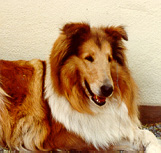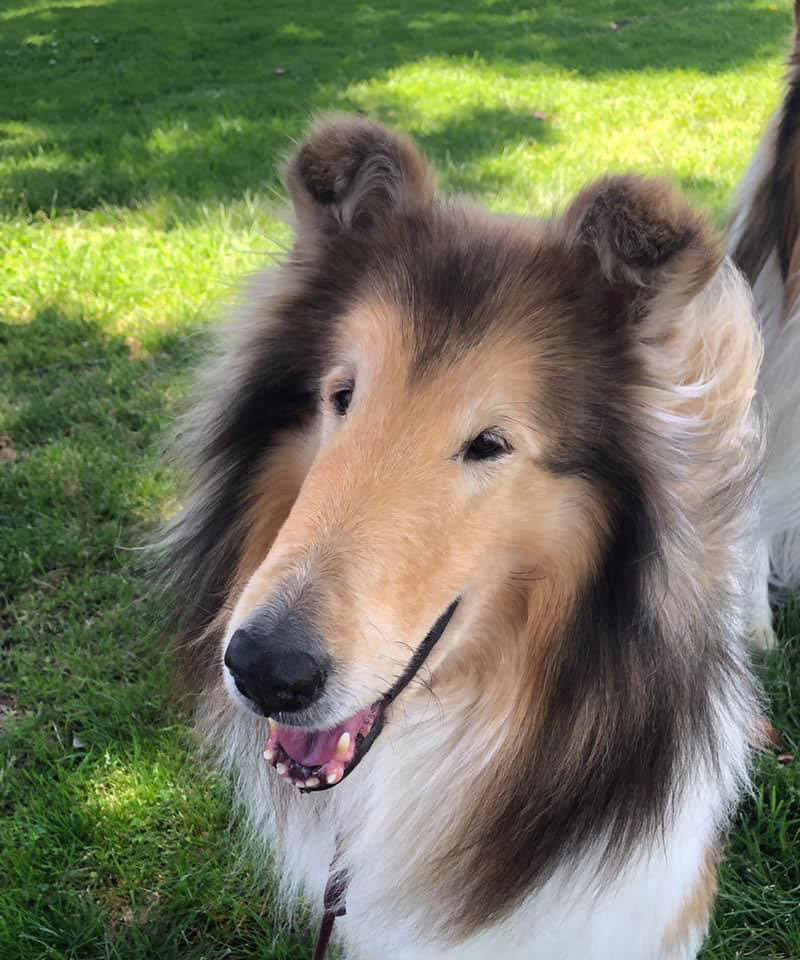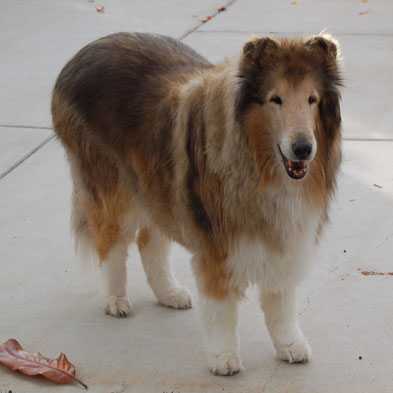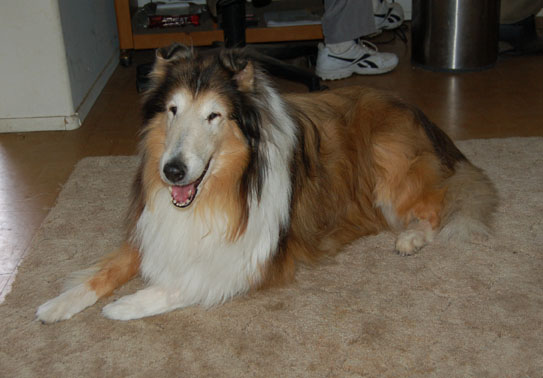

On average, Collies typically live 10 to 13 years, but many go well beyond the age of 13 and I have heard of a few Collies reaching 15 and beyond. Generally, it is thought that the smaller the dog, the longer lived and the bigger the dog, the shorter lived. Just like with people, old age is relative. Some Collies age gracefully, while others do not. Some are old at 8-10, while others remain youthful and full of pep well into their 12th or 13th year. Aging depends on the breed of dog, the genes, the kind of care and the amount of stress in the dog's life. Typically, it is thought that a large breed of dog is considered a senior at anything above 6, but I have found in my own personal experience with Collies, that senior aging doesn't really start until they begin approaching the age of 8 or 9. I love senior Collies! I have had lots of them reach the age of 12 and beyond and typically I have 2-3 oldsters at any given time.
As with the human experience things can and will go wrong. The older dog's needs become quite different depending on how well they are aging and what particular health problems are developing. Their predicament can be tentative and fragile. Unfortunately, most of the problems that occur as a result of the aging process are irreversible. About all we can do is take care of our elderly dogs the best way possible, giving them the best medical care, lots of love and making sure they spend their golden years as comfortable as possible.
In recent years, Veterinary medicine has made tremendous strides in treatment, drugs and preventative medicine. Not only are dogs living longer (just as people are), but we have become more cognizant of their needs and care. Plus, there a gazillion new drugs to help in their care. Caring for the senior dog has become big business, with so many products available that dog supply companies sometimes devote 3-4 pages to senior care products in their catalogs. For instance, the current “Doctors Foster and Smith” catalog devotes six pages to arthritis and joint care.
Some typical signs of the aging process are decreased activity and appetite, longer hours sleeping, stiffness in the extremities, overall loss of flexibility, and dryer skin and coat. Add to that list, loss of hearing and vision, and sometimes personality changes.
Most Veterinarians recommend occasional health checks and blood work as a form of preventative medicine for the older dog. Many offer a special “geriatric panel”. This is especially a good idea if your aging dog just doesn't seem right. Blood work can be such an invaluable diagnostic tool and can give early warning of some health problems, such as diminished kidney and liver functions, and diabetes. Heart failure, anemia, lower thyroid levels and cancer can all be problems for the aging dog. It pays to keep on top of these health issues, before something gets out of control, as catching problems in the early stages can make all the difference in treatment and survival.
Something to watch for in the older bitch that has not been spayed (or younger bitch for that matter), is the life-threatening uterine infection called Pyometra. If you breed Collies long enough and have “intact” bitches, chances are good that you will eventually run into Pyometra. It’s a condition in which the uterus becomes pus filled with bacteria and toxins. It usually occurs following estrus and is more common in the older bitch. Some of the more obvious signs are reduced appetite, lethargy, fever, excessive water drinking, urinating more than usual, and vomiting. The bitch may or may not have a discharge. If you have an older unspayed bitch that is exhibiting any of the above symptoms, it is of utmost urgency that you get her to your Veterinarian immediately before it’s too late. Pyometra is such that the longer you wait; the more dangerous it is for the bitch. If it isn’t caught in time the infection can enter the bloodstream causing toxic shock, leading to death. It can be diagnosed by various means including Xrays, ultra sound, cultures and blood panels (an elevated white blood cell count is typical). Early diagnosis and treatment are imperative! Likewise, the older male that has not been neutered can develop testicle or prostate problems, so keep an eye on any changes in the older male’s testicles or urinating habits (especially blood in the urine).
As the Collie ages and slows down, the diet may need to be altered, as well as reduced in quantity. Aging typically witnesses a reduction in appetite. Or you may discover overnight that your less-active Collie has suddenly become obese (especially if spayed or neutered). Obesity is not doing the older dog any favors because it can add stress to already weakened bones and joints. Consequently you may need to reduce the amount of food or change the type of food entirely. Personally I have never had a healthy Collie lose its appetite due to age, but I have had quite a few become obese. As a rule Collies are easy keepers, so you do need to watch their weight! There are numerous good senior diets on the market. However, some are not only lacking in palatability, but also too low in protein or fat. As a result, the older dog can either get too thin or the coat becomes dry and brittle. Some older dogs, for no obvious reason, develop touchy stomachs and cannot be fed the same food they have previously been fed. It may take experimenting with different food sources to find a food that works. As long as the older dog is doing well, I generally leave them on the same diet they’ve had their entire life, but I feed smaller portions. I feed Eukanuba
Adult Lamb & Rice, but I have on occasion had good luck
with the Eukanuba Natural Lamb & Rice Senior. Some of the major dog food companies have excellent information on their web sites on the feeding and care of the older dog. Also available are various vitamin supplements specially formulated with antioxidant nutrients, with the senior dog in mind. Some of the major dog food companies have excellent information on their web sites on the feeding and care of the older dog. Also available are various vitamin supplements specially formulated with antioxidant nutrients, with the senior dog in mind.
Doctors are discovering the value of moderate exercise in older people. The same rules apply to dogs. Older dogs still need exercise, but not as strenuous as previous years. Many Vets are recommending non-weight bearing exercise such as swimming and/or underwater treadmill. The underwater treadmill, previously used almost exclusively with horses, is becoming popular for dogs. It can help strengthen and maintain muscle mass which deteriorates as the dog ages. I recently had an occasion to use the underwater treadmill on a young bitch that had a tendon injury. While there I observed lots of older dogs using the swimming pool and treadmill. Businesses are popping up all over that cater solely to dog exercise. One such place here in San Diego is “The Total Dog”. It’s an amazing place with knowledgeable and caring animal practitioners that cater to young and old patients alike.
It is not unusual for some older dogs to have loss of vision or hearing and indeed, dogs can become completely deaf and/or blind. Unfortunately other than treating them with kindness and respect, nothing much can be done in these two areas. Make sure the ears and eyes are kept clean and free of matter. Often as a dog ages, the eyes will show a cloudy or bluish-transparent haze on the pupil. This is completely normal and is not the same as cataracts (and yes, dogs can get cataracts!). Also be sure to clean the nose leather of any gunk or residual food.
Typically Collies are not prone to ear infections but it doesn’t hurt to occasionally check the ears and clean them with ear wipes or cotton balls with alcohol. I have noticed sometimes the older dog’s ears can get very oily or greasy. It helps to trim the hair inside the ear.
Just like people, older dogs can experience cognitive dysfunction - confusion, disorientation, etc. It even has a name “Cognitive Dysfunction Syndrome”. Onset is gradual and cannot be attributable to any other medical conditions. There are several drugs available for treatment, so consult your Veterinarian to see what options there are.
A major area of concern in the older Collie is teeth. Unfortunately, dental hygiene is often overlooked or not considered important. It’s extremely important! Tartar build-up on neglected teeth can lead to all sorts of problems, such as loss of teeth, and inflamed and infected gums (gingivitis or periodontitis). Gum disease can play a major role in the over health and wellbeing of the dog. Bacteria from infected teeth and gums can affect major organs such as the kidneys, liver and heart. Some Collies seem prone to excessive tartar collection as they age and you may find yourself having to keep up with the teeth more often than in previous years. I have used C.E.T. Enzymatic Dentifrice with good results. The kit comes with tooth paste and a finger brush that is very gentle on the dog's gums, but it can be a pain to use. There are lots of other products as well. Also, I own several dental tools and have scaled the teeth myself, but it takes great patience and care so as not to damage the enamel on the teeth and/or the gums. If the teeth become too loaded with tartar, about the only solution is to have the teeth professionally cleaned. This does pose certain risks since anesthesia is used to put the dog out while cleaning. Most owners worry about anesthesia, but today there are many safe products on the market such as “Propofol”. Not only does anesthesia assure proper cleaning but on the oft chance that a dog might need to have teeth pulled, he/she will already be under. With older dogs, most Vets want blood work done and the dog on antibiotics prior to the teeth cleaning (my Vet does!). Anesthesia-free teeth cleaning is another option. However, this is not for all dogs. Some dogs do not tolerate the lying down and scaling of the teeth while fully awake. Also, this method is not a viable alternative if teeth need to be pulled. The best plan is to keep up with the cleaning of the teeth before they become a serious problem, but I know from firsthand experience, that is easier said than done!
A common problem that seems to affect many of the larger breeds, including older Collies, is arthritis. It can occur in any joint, but is most common in legs, hips, back and neck. As dogs (and people) get older, the natural occurring cartilage that cushions bones/joints begins to deteriorate. In my own personal experience this has been the greatest health problem I have run into starting around the age of 11 or 12, in otherwise healthy Collies. I have had to put to sleep more healthy Collies for this reason than all the others combined. Sooner or later, your aging Collie will probably show these signs: stiffness, soreness or lameness. In years past a dog owner was pretty much limited to treatments of aspirin or various cortisones and steroids. However today there are several really good alternatives to these previously used drugs. These drugs are labeled non-steroidal and anti-inflammatory (NSAIDs) and they require a prescription from a Veterinarian. They won't cure arthritis (there is no cure), but they may help alleviate some of the problems such as: pain, stiffness and swelling typically seen in the arthritic dog. One such drug is Rimadyl. This drug remains controversial as some people have had great success with it, while others have had dogs experience serious side effects and in some extreme cases, death has allegedly occurred. I have used Rimadyl successfully on several dogs over the years, whose lives were extended thanks to this drug and I have not had one single adverse reaction. If using Rimadyl, your Vet will want to do blood work every 6 months or so to check the liver function. There are several other similar drugs on the market, such as EtoGesic, Deramaxx and Metacam. In the last couple of years my drug of choice has been “Metacam Oral Suspension” made by Boehringer Ingelheim. It is a palatable liquid that can easily be squirted on the food or directly into the mouth. I currently have a 13½ year old bitch on it. It has really helped with her stiffness and mobility (her 14½ year old mother was also on this same drug for the last year of her life with no ill effects), but like many of the drugs of this nature, occasional blood work is a necessity as there can be serious side effects. Some of these drugs may cause gastric upsets, so it may take experimenting with the different drugs available to see which one works best. Consult your Veterinarian regarding all the choices, as drugs are constantly changing or being introduced.
Tramadol is another drug that has been used successfully in recent years. It is a man-made narcotic-like pain reliever ( analgesic) used to treat moderate to severe pain and it really helps!! I have had my last four older Collies on this drug, in combination with either Rimidyl or Metacam. It is not without side effects, so watch carefully any dogs that are on it. I currently have a 12½ year old male on Rimidyl twice a day and one Tramadol morning and evening. It is only available from a Veterinarian and it’s a popular people drug too!
There are various buffered aspirin products available on the market. However, with any aspirin product, the owner needs to be aware of possible stomach irritation. Consult your Veterinarian before using any supplements or combining different drugs. When things get to the point of no return and a dog is having tremendous difficulty getting up, laying down or navigating, more extreme measures may be necessary. Some Veterinarians might suggest a daily dosage of Prednisone (a corticosteroid that suppresses inflammatory responses). This drug should never be used without first consulting a Veterinarian. Not only can it have dangerous side effects, but it can cause death when combined with other drugs (such as aspirin). Basically any drug used on the older pet is just buying the dog a little more time and trying to improve the quality of life, but by the same token, you don't want to destroy the dog doing it.
There are lots of drug-free nutritional supplements on the market that help with joint support. These popular supplements are generally a combination of products: Chondroitin Sulfate & Glucosamine HCl. Usually these two supplements are combined with Vitamin C or MSM (Methylsulfonylmethane). Many dog owners, as well as Veterinarians have had good luck with these joint care products. In fact, some of the better known dog food companies are now adding these supplements to their foods. There are so many joint supplements on the market today that it would be impossible to list them all. They come in pill form, chewy tablets, chewy sticks and liquid. Many are beefed up with other additional antioxidants (such as reserveratrol). One of my personal favorites is Cosequin DS, specially formulated for large dogs.
Another non-drug option is “Adequan Canine”. This is an injectable substance known as a "polysulfated glycosaminoglycan” and it is similar to the oral supplement Glucosamine. It is administered as a series of intramuscular shots and it can be pricey. I used it on an older Collie with good results. It’s hyped not only as a pain reliever, but also as a therapy because supposedly it rebuilds cartilage in damaged joints. It has mild side effects compared to NSAIDs, but liver and kidney changes should be monitored, along with platelet numbers that could result in clotting issues.Some owners have had success with alternative treatments such as acupuncture. Another relatively new treatment (new to Veterinarian medicine) is laser therapy. A growing number of owners of elderly pets are using it to help relieve the chronic pain of aging and arthritis. Laser treatments can be especially helpful in dogs suffering from arthritis as supposedly it reduces inflammation and improves the blood flow to the affected area. It can also be used following surgery to help speed up the healing process. It can be costly and involve multiple treatments for it to be effective. However, if used properly it’s not known to cause any problems and doesn’t have the potential side effects that using certain NSAIDs can have. It might prove difficult finding a Vet that has the equipment and is trained to use it, but you might be able to find an animal practitioner that is trained in its usage. The previously mentioned facility in San Diego (The Total Dog) offers laser services.
Also please note, there can be reasons other than arthritis if a dog is exhibiting muscle weakness, limping, dragging of paws, stumbling or lameness. If you have a Collie that exhibits any of these symptoms (especially one that is not that old), your dog may need to be screened for DM (Degenerative Myelopathy). DM is a non-reversible, progressive disease of the spinal cord and there is no cure. Typically it begins with loss of coordination in the hind legs. The Orthopedic Foundation for Animals (OFA) has a DNA test for DM. Collies are not listed as one of the predisposed breeds, but some Veterinarians are suspecting the disease is more prevalent in Collies than originally believed.
Here are some tips to make life easier for the senior Collie……..There are orthopedic beds with lots of foam rubber, made especially with the senior pet in mind. Also, heated pads or bedding might help to make the aging pet more comfortable. In order to reduce neck and back strain, consider using raised bowls for eating and drinking. To prevent slipping and injury you may need to cover slippery tile floors with throw rugs, runners or carpet remnants. If your dog is having trouble navigating stairs, there is a huge selection of ramps available for sale starting around $90 and up.
NEVER, EVER should the older dog be left outside to deal with the weather elements, whether it be heat or cold. Not only is the older dog’s immune system not what it once was, but the older dog is less adaptable to temperature changes. Not only do they need to be protected from weather extremes, but they deserve it, after all the great rewards they have given to the owner!The older dog may need to go outside to eliminate more often. The once fastidious oldster may find themselves in a position of not being able to “hold it” as they once were able. Thus, more frequent trips outside become necessary. A frequent Collie problem (and other breeds as well), is a condition found especially in the spayed bitch.....urinary incontinence. This condition is a medical problem and has absolutely nothing to do with housebreaking. There are various products on the market, such as “Proin” or DES (Diethylstilbestrol - a synthetic form of the female hormone estrogen) that can help with this condition, but in many cases, neither drug works. Another drug, “Incurin” (synthetic estrogen) has been used successfully. First though, infection should be ruled out. Consult with your Veterinarian about taking in a urine sample to check for infection. If infection is ruled out, more than likely the problem is incontinence from being spayed and the resulting loss of hormones. There are several studies currently being done relating to this problem. For the last several years I have been having my bitches spayed and leaving in one ovary. So far it appears to be working with no ill effects to the bitch. Several well known Collie breeders have been doing this procedure for 15-20 years. If anyone would like more information on this, I can put you in touch with my Veterinarian. One unexpected plus of leaving in one ovary, is the fact that the bitches do not get that fluffy, cottony, almost-impossible-to-groom spayed coat!
Speaking of coat…….Grooming the older Collie can be tricky, especially if they have been spayed or neutered. The “altering” seems to have a profound effect on the coat and not for the better!! Within several months of the surgery, the coat turns wispy and cottony, making grooming ten times more difficult. I personally find it helpful to trim the older Collie's coat (especially bitches), around the pants area and on the inside of the back legs. Due to stiffness, sometimes it is difficult for an older Collie bitch to squat all the way down, when urinating. As a result, many end up peeing on their long coat in the back area. I give all my older Collies a “puppy trim”, where I trim all the long hair all the way around, front and back. Not only is this done for hygiene, but also as a Collie ages, they don't tolerate the stress of being groomed for long periods of time. I truly believe the act of grooming is hard on their already sore joints. So the “puppy trim” actually serves two purposes – hygienic and ease of grooming. Plus I have found that around the age of 12, they are not as steady on the grooming table, as they once were, so I have to make sure they are willing to lie down on the table. Be sure to keep an eye on your dog’s nails. As they get older and exercise decreases, the nails do not wear down as they once did. Plus they have a tendency to get thicker and are harder to trim.Personally I just cringe every time I see or hear of an older Collie being abandoned or given up for adoption or placed in rescue...my heart goes out to them. I just can't imagine such a thing and the cruelty of it all. When I see older Collies on rescue websites, I wish I could take every single one of them! Several rescues, such as NorCal Collie Rescue (http://www.calcollierescue.org/) have special funds for senior Collies that end up in rescue. Nor Cal’s fund is appropriately called “The Angel Fund”. Collies especially, more so than any other breed (thanks to their extensive history of close ties to humans), deserve so much better than this! After all the pleasure your dogs have given over the years, they deserve the best care and treatment possible whether they be a retired show champion, retired brood bitch or a valued pet. Whatever they may be, they deserve the extra time and care that comes as a result of their aging years.
Most important of all, don't forget the love and attention that they crave and deserve! It becomes a rewarding experience for all involved!
If you need more information, don’t hesitate to contact me. I’ll be more than happy to help! chelscolly@icloud.com

Grissom (GCHB Chelsea Casanova Cowboy) pictured at 11 1/2 years
.jpg)
Camille (Ch. Chelsea Summer Blonde) at the age of 11. She's a happy camper and in wonderful condition for her age!

"Natasha" - Ch. Chelsea Sunshine Girl at 11½ years, illustrating the puppy cut we do on our older bitches

"Wendy" - Ch. Chelsea The Crown Jewel at 12½ years old

Wendy's brother "BJ". He is 12½ years old! This picture was taken on the occasion of his 12th birthday! He is owned by Sherrie Parker.
